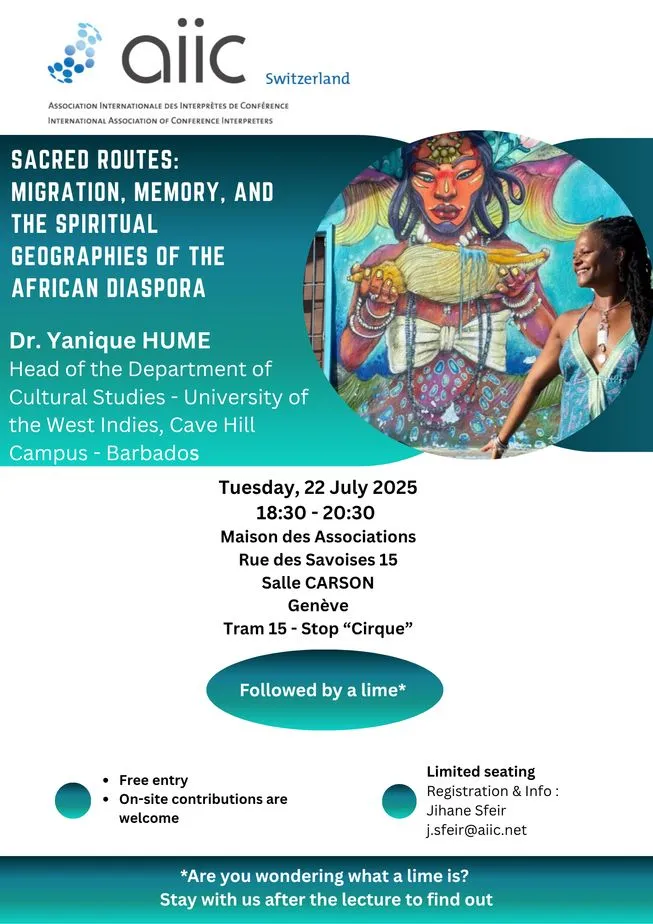
One evening last July, African spiritualities and sacred practices took centre stage at an event organized in Geneva by the International Association of Conference Interpreters (AIIC), of which I am a member. This high-level conference was given by Professor Yanique Hume, Director of the Department of Cultural Studies at the University of the West Indies of Barbados (UWI, Cave Hill Campus, Barbados).
With her presentation entitled “Sacred Routes: Migration, Memory, and the Spiritual Geographies of the African Diaspora”, this engaging lecturer -who is also a renowned anthropologist, researcher, choreographer, dancer, and specialist in African regions- retraced the journey of African spiritualities transported during the Transatlantic Slave Trade from the coasts of West Africa to the New World in the very bodies and memories of those enslaved.
For two hours, Dr. Hume held sway over an audience of some sixty people - no mean feat during the summer holidays - comprising twenty different nationalities, including conference interpreters, members of the Afro-Caribbean diaspora (diplomats, international civil servants, students from the Geneva Graduate Institute and other guests).
Unfamiliar words, such as Orishas, Lwa, Papa Gede, Obeah, Vodun, entered our consciousness, opening our eyes to an African cosmology and spiritualities that are unknown to many and disparaged by some. Yet to this day, they remain deeply rooted in the memory and lives of members of the African diaspora, whether in the Caribbean or in the Americas.
At the same time, the presentation highlighted the undeniable influence of Christianity -and Catholicism in particular- on these religious beliefs, notably in sacred art, the cult of saints and religious rituals. It was indeed this syncretism that enabled African spiritualities to survive in their new social and religious environment.
For Dr. Hume, these Sacred Routes -still the routes of modern-day migration- represent pathways of resilience, spiritual movement and reimagination that have helped sublimate the violence of the Middle Passage and Africa's encounter with Europe and the Americas.
Mapping these routes allows descendants of the enslaved to reconnect with their roots, while honouring the memory of their ancestors and the creative survival of their spiritualities. It also gives each of us, whatever our origins, an opportunity to discover a little of Ourselves in the Other, by acknowledging the similarity of our beliefs.
As one participant said, “What a beautiful reflection on the fluidity of being and our shared humanity, and which calls for greater understanding and goodwill amongst people, communities and religions!”
Indeed, this is precisely the aim of Island Routes, a course to be organized by Dr. Hume in Barbados in January 2026 with the Department of Cultural Studies of the UWI and Ocean Inspiration. Watch this space!
Author : Jihane Sfeir
English Translation by Joy Lewis (https://www.aaatranslationservicesbb.com/en/)
